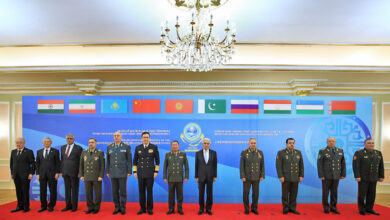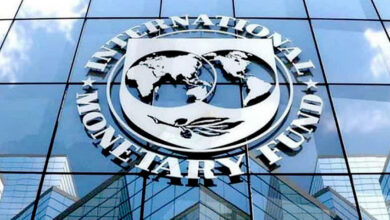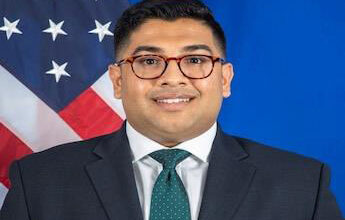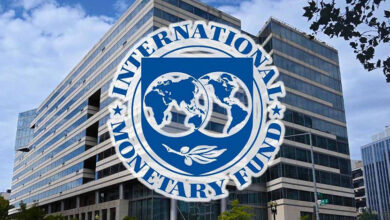Littoral States Confer at Indian Ocean Dialogue to Power ‘Age of Asia’
New Delhi. A conference in Singapore September 1 and 2 brought together the critical states and principal maritime partners in the Indian Ocean Region (IOR) together on one platform to deliberate upon issues and areas of mutual interest especially those pertaining to region wise national security and national development, vital to usher in the ‘Age of Asia’.
India is a critical pivot of the Indian Ocean, whose waters wash three sides of the country, creating 7,500 kms of coastline, 1200 islands and 2.4 million square kms of an exclusive economic zone (EEZ). 90 per cent of India’s trade by volume and 90 per cent of the country’s oil imports are carried on the seas, making India a natural maritime country.
The two-day conference, a unique initiative to convene critical states, key stakeholders and principal maritime partners saw a gathering of luminaries who deliberated on how to create a zone of shared security, shared prosperity and shared development in the Indian Ocean Region.
The conference was organised in Singapore by the India Foundation, a leading Indian think tank close to the government Singapore. Along with the Institute of Policy Studies, Sri Lanka; the Bangladesh Institute of International & Strategic Studies (BIISS), and the S Rajaratnam School of International Studies (RSIS), Singapore as co-hosts for the event.
The timing of the conference, the first such exercise ever, was “very interesting, in the context of the maritime troubles in the South China Sea,” an official source told India Strategic.
The Indian Ministry of External Affairs (MEA) was represented by Minister of State for External Affairs MJ Akbar and Foreign Secretary S Jaishankar.
India has been urging countries to adhere to the UNCLOS (United Nations Conference on Law of the Sea), most recently at the recently concluded US-India Strategic and Commercial Dialogue (S&CD).
In a joint statement issued after the S&CD, India and the United States said, “In the context of recent developments, the Sides stressed the importance of maintaining freedom of navigation, freedom of overflight, and unimpeded lawful commerce throughout the region, including in the South China Sea. They urged the utmost respect for international law, as reflected in the UN Convention on the Law of the Sea (UNCLOS),” clearly urging Beijing to take heed.
These are repeated “efforts to maintain pressure on China, which has refused to accept the Arbitration Panel’s ruling against it on Beijing’s claims to the South China Sea,” an official told India Strategic.
“The importance of the Indian Ocean resonates far beyond its shores. Its marine waterways carry two-thirds of the world’s oil shipments, one-third of its bulk cargo and half of the world’s container traffic. Over three-fourths of its traffic goes to other regions of the world,” said External Affairs Minister Sushma Swaraj to the conference via a video link.
“The Indian Ocean is not only critical to the future of the world but one can also assert that the tides of this body of water will determine the dynamics of the Asian century,” the EAM said.
Outlining the Prime Minister’s vision for the Indian Ocean, outlined in what he called “SAGAR” or Security and Growth for All in the Region, the EAM said, “SAGAR means the ocean and entails a five-pronged approach. This involves: – enhancing capacities to safeguard land and maritime territories and interests, – deepening economic and security cooperation in the littoral, – promoting collective action to deal with natural disasters and maritime threats like piracy, terrorism and emergent non-state actors, – working towards sustainable regional development through enhanced collaboration, including through the Indian Ocean Rim Association (IORA), and – engaging with countries beyond our shores with the aim of building greater trust and promoting respect for maritime rules, norms and peaceful resolution of disputes.”
“India has shown commitment to working with its littoral neighbours to fully develop the Blue Economy, develop India’s coastal and island territories, and link the hinterlands,” she said.
On India’s commitment to ensuring security in the Ocean region, she said, “The Indian Navy has been part of anti-piracy patrols in the Gulf of Aden and the sea routes of the Indian Ocean since 2008 and has undertaken 50 anti-piracy escort Missions. India has undertaken projects to help enhance the coastal and EEZ surveillance capacity of the Indian Ocean island states,” she concluded.
Delivering the inaugural address at the Indian Ocean Conference themed ‘Global Power Transition and the Indian Ocean,’ Sri Lanka’s Prime Minister Ranil Wickremesinghe September 2 called for establishing an Indian Ocean Assembly to bring together the Indian Ocean nations to ensure the safety and security of the region.
Mr Wickremesinghe said the Indian Ocean had emerged as one of the world’s busiest and most critical trade corridors, rapidly surpassing the Pacific and Atlantic Oceans. Historically a bridge between the East and West, the region today has acquired an intrinsic significance of its own, he said, saying there were “major power interests” at play, particularly those of China and Japan, over the region.
Those geographically located in the region had a primary interest in the security of the Ocean which, he said, was linked to their economies and the livelihoods of their people.
“It is time for Indian Ocean countries especially Asian nations to take the lead in determining their own future. It is our belief that an Indian Ocean Order needs to be crafted with accepted rules and agreements that would guide interactions between states,” Mr Wickremesinghe said.
“The Indian Ocean Order would have the primary responsibility of upholding the freedom of navigation in the Indian Ocean, ensuring that shipping and air routes to East Asia and beyond are kept open, building closer economic cooperation amongst countries in the region, incorporating an Indian Ocean Development Fund for development of the region, and in particular, establishing a strong Humanitarian Assistance and Disaster Management mechanism to deal with natural and manmade disasters,” he said.
“Our task, then, is to begin building a political eco-system that is both prescriptive and preventive; prescriptive in that it creates a structure out of the natural affinities of geography, culture and resources that already exist; preventive in that it contains the inevitable local disputes and prevents them from disrupting or spilling over on to a common Indian Ocean agenda,” the Lankan Prime Minister proposed.
“India, geopolitically in the centre, has become the Pivotal Power of Asia,” said MJ Akbar, MoS in the MEA. “India is the western frontier of peace, and the eastern frontier of war,” he said.
Mr Akbar, expanding on that statement said, “Look east from India to Japan: there is a diverse range of people, religions, languages, cultures, polities and nations. But there is one powerful factor in common: each nation is rising from problems of the past in the search for economic growth, stability, social order and cohesion. This is the Phoenix Horizon.”
“Look west from India, from its immediate western neighbour to West Asia and northern Africa. Within the variety of nations and peoples the one focal factor is conflict, with some islands of relative calm struggling to retain their composure in a region pockmarked by war and terrorism. The rise of contemporary terrorism originates with sanctuary provided to the most vicious and barbaric terrorist individuals and organizations by our immediate western neighbour. This is compounded by radicalisation, terrorism, quasi-religious, multi-ethnic and tribal contradictions; while seepage and spread of a radical ideology that distorts Islam has incubated groups like Daesh. This is the Toxic Horizon,” Mr Akbar explained.
Outlining India’s policy priorities for the region the MoS said, “We seek measures that will facilitate the natural flow of peaceful inter-action and consequent growth through cooperation. We do not believe that regional confrontational attitudes are helpful in the ocean, or extended regions like the South China Sea, to give one instance. Law must be respected; after all, law preserves order,” he asserted, clearly indicating and, indeed, indicting China.
Bangladesh sought freedom of navigation and safety and security of the sea lines of communication in the Indian Ocean, in order to enhance international trade and economic cooperation.
“We must follow the path of cooperation and collaboration, not competition and conflict in tapping the full potentials of the Indian Ocean,” said Bangladesh Foreign Minister AH Mahmood Ali, speaking at the conference plenary session.
He cited piracy, terrorism, human trafficking as well as narcotics smuggling as key security challenges, and urged all countries to cooperate in tackling these menaces.
Mr Ali also specifically outlined the pragmatic actions taken by Dhaka to peacefully settle its maritime problems with its neighbours India and Myanmar.
India had “absolutely accepted an award by the UNCLOS arbitral panel” (on the maritime boundary issue) in favour of Bangladesh, “in the spirit of good neighbourliness,” an official in the MEA told India Strategic.
Giving a keynote address at the conference, India’s Foreign Secretary S Jaishankar said, “Not coincidentally, stronger connectivity is at the heart of the ‘Neighbourhood First’ policy of the Modi Government. Whether it is the Kaladan transport project leading to Sittwe port in Myanmar; or the Trilateral Highway to Thailand; railway modernization, inland waterways, coastal shipping, or port development in Bangladesh, or in Sri Lanka; today, better logistics is the dominant theme of India’s neighbourhood outreach.”
“Historically, the Indian Ocean was a ‘highway’ linking great multitudes across vast geographies. As our connectivity vision and capabilities expand, this critical role can actually be played once again. For the Indian Ocean to attain its true potential, it is imperative that India, which is its centre of gravity, should be a facilitator rather than an obstruction. That requires a smoother movement of goods and people within India but also to its immediate neighbourhood. And beyond,” said Dr Jaishankar.
Outlining the centrality of the Indian Ocean to global development, the FS said, “Hinterland economies have increasingly become linked to maritime trade. It is apparent today that the development of their infrastructure that can be a game changer in elevating the importance of the Indian Ocean. We are working on ambitious plans for port and port-led development that would make our 7,500 km coastline more relevant to the future of the Indian Ocean and India. We are similarly looking at more aggressively developing some of our 1,200 islands.”
“Security challenges in the Indian Ocean are addressed by different countries in different ways. In India’s case, they are essentially an outcome of national capabilities, buttressed by participation in relevant regional platforms. The ASEAN Regional Forum, in particular, is evaluated highly by us as a forum to share perspectives,” India’s top diplomat said.
“Closer to home, we are developing trilateral cooperation with Sri Lanka and Maldives. Where naval interests are concerned, the steady growth of the 35-nation Indian Ocean Naval Symposium over the last decade has been a very encouraging development. It has helped to promote a shared understanding of maritime issues, enhance regional maritime security, strengthen capabilities, establish cooperative mechanisms, develop inter-operability and provide speedy HADR responses,” he said.
“We also believe that navies working together in pursuit of shared security goals have a stabilising impact. India participates in a number of bilateral exercises with Singapore, Sri Lanka, France and Australia amongst others. In addition, we partner the US and Japan for the Malabar set of exercises. The Joint Strategic Vision for Asia-Pacific and the Indian Ocean that was agreed to in January 2015 during President Obama’s visit to India is another example of our openness to international cooperation in this sphere. With some of the Indian Ocean island states, notably Sri Lanka, Maldives, Mauritius and Seychelles, we have supplied naval equipment, provided training and undertaken hydrographic services. We remain open to working with other partners in this ocean, including in East Africa,” Dr Jaishankar outlined.
“The start of the twenty first century is seen as ushering in a new ‘Age of Asia’, in which the natural unity of the Indian Ocean can once more assert itself,” the Foreign Secretary stated.





